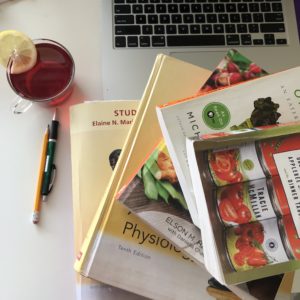 I’ve been busy lately preparing for my final exams on Anatomy and Physiology and Graduate Topics in Holistic Nutrition at the American College of Healthcare Sciences.
I’ve been busy lately preparing for my final exams on Anatomy and Physiology and Graduate Topics in Holistic Nutrition at the American College of Healthcare Sciences.
I feel like my success depends entirely on the quality of my long-term memory. The long-term memory has enormous capacity, and it may last a lifetime (Marieb & Hoehn, 2016).
To prepare for the final exams, the students are using the declarative or factual memory. It entails learning the precise information and lots of details and facts. It requires the conscious processing and association with previously learned facts (Marieb & Hoehn, 2016). That’s why it may feel so overwhelming!
I wanted to share four critical approaches that can strengthen the long-term memory (Marieb & Hoehn, 2016; Marx & Gilon, 2013):
1. Maintain an alert, aroused state of consciousness.
I notice that when I feel tired, my brain and memory do not work well. Taking breaks and bringing myself back to a conscious state helps to come back to studies with a refreshed mind.
2. Repeat and rehearse the facts and details.
Repeating and revisiting the information is crucial, as it is hard to remember all the tiny details from the first time.
3. Create associations between new information and previously learned information.
When I try to integrate the new information with what I already know, it seems to cling to my brain with less effort. I noticed that being creative in making these associations makes the learning process more fun.
4. Allow time for chemical and structural changes to occur in the brain.
I think it helps to know that the absorption of new information takes time and that it can not be forced into the memory. Even at rest and during sleep and extracurricular activities, the brain is still working on consolidating new information.
And I would also add that eating quality foods, getting daily exercise, and allowing some downtime to rest and unwind can help to support the health of the brain cells and the body as a whole. I might write a separate post on this topic later.
Wish me good luck with the finals 🙂
Thanks for visiting my blog and good luck to all the students out there!
References:
Marieb, E. & Hoehn, K. (2016). Human Anatomy & Physiology (10th ed). San Francisco: Pearson Benjamin Cummings.
Marieb, E. & Hoehn, K. (2016). Human Anatomy & Physiology Study Guide (10th ed). San Francisco: Pearson Benjamin Cummings.
Marx, G., & Gilon, C. (2013). The Molecular Basis of Memory. Part 2: Chemistry of the Tripartite Mechanism. ACS Chemical Neuroscience, 4(6), 983–993. http://doi.org/10.1021/cn300237r
